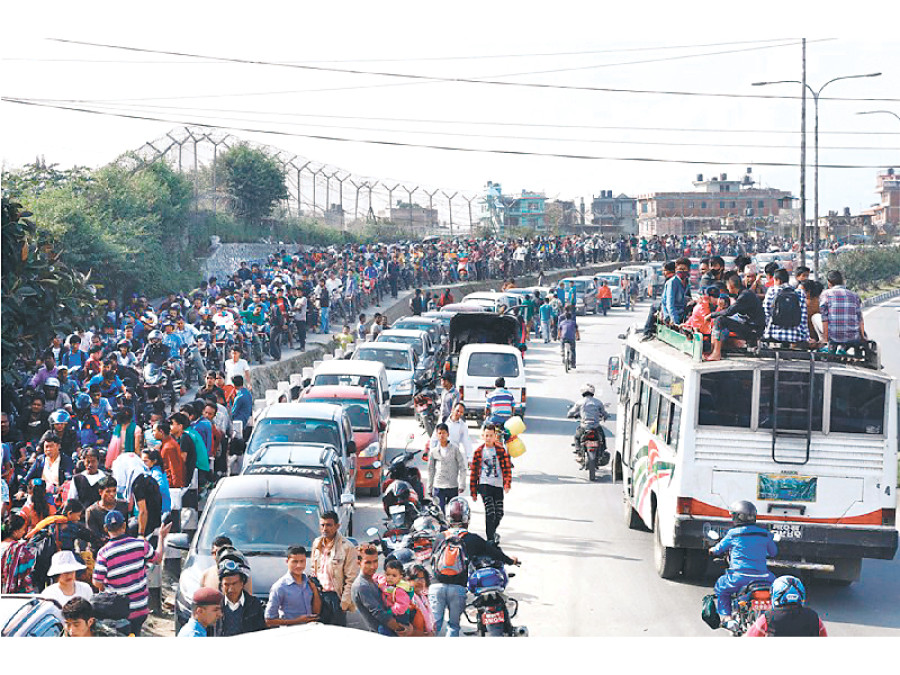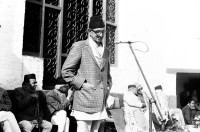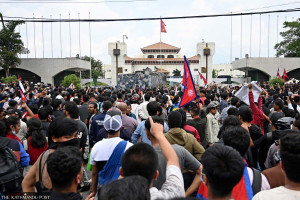Opinion
Free the market
The fuel crisis is a result of the monopoly of Nepal Oil Corporation over the import of petroleum products
Umanga Pandey
The new constitution of Nepal is a result of two decades of civil unrest, ideological contestations, and the expression of Nepal’s aspirations and insecurities. Yet, no sooner it was promulgated, it was met with protests and an ‘undeclared’ blockade by Nepal’s southern neighbour. The resultant acute shortage of fuel raises many questions. Is a life with freedom and dignity possible without cooking gas or fuel for transportation? Is such a life possible when we spend 30 hours in line for five liters of petrol? The answer, clearly, is a ‘No’.
The constitution is linked with this state of affairs because it not only defines our political processes, but also our economic systems. The new constitution promotes the idea that the government and its agencies are best suited to resolve Nepal’s economic problems. History has proven otherwise. Competition, even without perfect markets, takes us closer to a free market, ie, “free from any intervention by a government, price-setting monopoly, or other authority”. And in most developed nations, practices that stifle competition are treated as criminal activities. In fact, the only economic role of a government in a free market economy
is to ensure that the markets remain
competitive.
The government’s job, therefore, is to penalise such monopolies, not to legitimise them. A government that runs a monopoly is effectively a feudal government. But even as Nepal’s constitution rejects feudalism in politics, it continues to build on the old feudal economic systems.
NOC monopoly
The current fuel crisis in Nepal is a result of the ‘feudal’ monopoly of the Nepal Oil Corporation (NOC). The NOC’s website (www.nepaloil.com.np), displays an impressive list of its achievements. This is in shameful contradiction of the NOC’s notices of fuel rationing and disrespecting consumers. The NOC decides on who gets fuel, and when. One day NOC officials announce that the fuel problem has been solved, and on the very next day, they say that there is no cooking fuel for the foreseeable future. In a developed world, such practices would be deemed criminal and the officials would be tried in the court of law. However, our constitution does not punish them. Instead, they are driven around in luxurious SUVs with armed security. Even our republican politicians continue to drive in five-vehicle entourages during this severe fuel crisis, when people do not have enough fuel to cook their meals.
The current economic grievances in Nepal amount to a state’s crime against the people. And the root of the problem lies in state-monopolies. Many criticise the privatisation of state-owned enterprises in the 90s as an irresponsible sale of nation’s resources. However, it is due to those privatisation measures that consumers do not have to line up for buying shoes and cement the way they have to for fuel or Nepal Telecom telephone connections. So, the only one way to free our economic system from political interests is by facilitating competition. Even so, the NOC’s call for a global tender to import fuel from non-Indian sources is still the protection of a monopoly. The right response would have been to give full freedom to all people and businesses to compete with the NOC to purchase fuel from any source.
As individuals, it does not make sense to travel to Tibet with a 10 litre-container for fuel. However, it would make economic sense for business houses to go to Tibet with 100. Yet, if someone were to do that, they would be arrested and their fuel would be confiscated, or they would have to pay such high taxes that would render the effort economically unviable. There only remains one alternative then—to take the high risk and charge a high price, ie, to create a black market.
And it is the customers who are forced to
pay for it.
For free market
It is tempting to think that the current fuel-shortage is just linked to Nepal’s constitutional politics. However, Nepal faced a similar situation when India blocked its border 26 years ago. Both then and now, there was/is a severe shortage of fuel but not of consumer items being imported from India. This is precisely because the latter did came through a competitive market. Granted, in times of shortage, prices go up, but at the very least, customers can buy goods from stores without having to resort to a black market, or be denied the goods altogether. A competitive market is able to source better, store better, serve better, and plan better than state monopolies.
If a person was to go to a store and ask for four eggs, and the storeowner only agrees to sell one egg, why would a customer continue to buy eggs from that store when there are others that will willingly meet the demand? This is precisely what the Indian Oil Corporation has been doing since the blockade began. Yet, why doesn’t the NOC negotiate with other sources? As political appointees, the NOC employees seem to have no incentive to serve those who consume fuel, the Nepali people. The NOC seems to be only accountable to Nepali politicians, who tell them what to do. The NOC is thus, not an economic but a political institution.
To ensure that we do not suffer from such fuel shortages in the future, it is neither enough to straighten out Nepali and Indian politicians nor to ensure that NOC gets additional supplies. It is of vital importance that we amend our constitution so that it welcomes free-market economic competition without suspicion. This fuel crisis should give a much-needed push for the ‘free market’ in our constitution. In fact, without freedom in economics, no political system can be considered free.
Pandey is an education-activist and was selected as an Asia 21 Youth Leader by the Asia Society in 2015




 12.93°C Kathmandu
12.93°C Kathmandu












